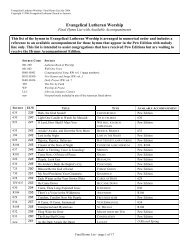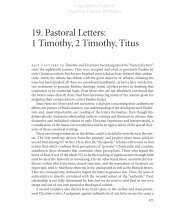Chapter 1 - Augsburg Fortress
Chapter 1 - Augsburg Fortress
Chapter 1 - Augsburg Fortress
Create successful ePaper yourself
Turn your PDF publications into a flip-book with our unique Google optimized e-Paper software.
22 | Eros and the Christ<br />
writing to an ailing friend, “Missing you brings home to us how useful and<br />
pleasant it is to have you. But though I long to see you with my every thought<br />
. . . .” 49 Or, finally, he wrote to his brother Quintus, “Can I put you out of<br />
my mind sometimes, or even think of you without tears? When I miss you (te<br />
desidero), I do not miss you as a brother only, but as a delightful brother almost<br />
of my own age, a son in deference, a father in wisdom. What pleasure did I ever<br />
take apart from you or you apart from me?” 50 In Phil 1:8, Paul announces that<br />
he has joined the ranks of the lonely: “I long for you all in the innards of Christ<br />
Jesus.”<br />
Papyri letters declare their writers’ longing by echoing Paul’s<br />
straightforward style, though with varied terminology. There is Paul’s term<br />
that he shared with hundreds of letter writers: ἐπιποθῶ or simply ποθῶ. It is<br />
surprisingly rare in the papyri, an accident of preservation perhaps. In a letter<br />
dated 212–217 c.e. a writer declares, “we who are longing (οἱ ποθοῦντες)<br />
pray that we enjoy you with our eyes and no longer by means of letters.” 51<br />
More often than ποθῶ, papyri letters employ ἐπιθυμεῖν or ἐπιζητεῖν, both of<br />
which occur in Philippians (1:23; 4:17). Desiring to see the recipient in the<br />
flesh was a popular motif, as this letter of Theanous from the second or third<br />
century c.e. to her mother illustrates: “I greet you, mother, wishing to catch<br />
sight of you already (ἐπιθυμοῦσα ἤδη θεάσασθαι) through this letter.” 52 In the<br />
second century a son wrote to his father Herakleides, “Know that we miss you<br />
(ἐπιζητοῦμεν σε) daily.” 53<br />
Paul seals his confession with an oath: “For God is my witness” (1:8). Letter<br />
writers in the first thousand years of the common era, regardless of religious<br />
conviction, spoke as if they had the same god when they confessed their<br />
longing. This god was the hope of parted lovers and separated friends. 54 The<br />
divine name had a reputation for making communion. 55 By the tenth century,<br />
this divinity bore the epithet “who makes into one.” 56 This god made the<br />
impossibility of communion between parted friends possible through written<br />
text: a letter was a “gift of Fate.” 57 For Christians, a “gift of God.” 58 For Julian,<br />
a “manifest saving presence.” 59 Not only did they pray to this god but they also<br />
called on it as a witness to their longing. Echoing the witness motif of Phil 1:8,<br />
Basil writes to Meletius, bishop of Antioch: “The good God, by affording us<br />
opportunities of addressing your Honor, assuages the intensity of our longing<br />
(τὸ σφοδρὸν τοῦ πόθου παραμυθεῖται). For He Himself is a witness of the<br />
desire (μάρτυς γὰρ αὐτὸς τῆς ἐπιθυμίας) which we have to behold your<br />
countenance and to enjoy your good and soul-profiting instruction.” 60<br />
As in Phil 1:8 (cf. Rom 1:11-12), a god was invoked to verify the unseen<br />
desire of the heart. 61 Greek letters in the first three centuries of the common




